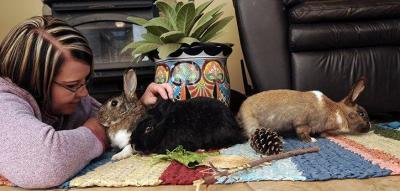
A Guide to Bunny-Proofing Your Home
When you're home and able to supervise, pet rabbits must be let out for several hours each day, both to exercise and to have social interaction with you and/or your other pets. But when you’re not able to supervise, pet rabbits should be kept in a safe, bunny-proof area. Rooms that are generally easy to rabbit-proof are the bathroom, laundry room, kitchen, and bedroom.
Before giving your rabbit free run of any area in your home, you must carefully inspect it for any potential hazards. You might have to deny your rabbit access to a space if bunny-proofing it is too difficult (such as a computer room, where there are numerous exposed wires). But the more space your rabbit has to roam, the more delight you will find in each other as companions.
The following is a guide to bunny-proofing your home — including pet rabbit safety issues to watch out for.
Stopping rabbits from chewing on wires
Rabbits love to chew wires of all kinds — electrical wires, telephone wires, computer cables. To protect your bunny, cover all exposed wires with plastic tubing, available at most hardware or electronics stores. This tubing goes by several different names, including polygon tubing, plumber’s tubing, and vacuum tubing. And it comes in various sizes, thicknesses, and types of plastic (some are hard while others are soft and easily bendable).
Home starts with you
Some wires can be taped up on the wall away from your bunny’s reach, making the tubing unnecessary. Don't forget to check for hidden wires in places that the rabbit might be able to get to that you can’t see — such as under a bed or behind furniture.
Preventing bunnies from gnawing on walls
Some rabbits will chew on the corners of walls or on window frames. Before allowing bunnies the run of the house, you’ll need to be patient and observe them for a while to see whether they have this particular habit. If your bunny finds a favorite spot to chew, you can purchase hard plastic or wood corner protectors from hardware stores to place over the area.
Protecting furniture from rabbits
If your rabbit chews on items like chair legs, kitchen cabinets, and baseboards, a product called Grannick’s Bitter Apple (available at pet supply stores) can be applied to the area being chewed. This product has a terrible flavor and should deter any further chewing. However, unfortunately for some reason a few rabbits seem to like the taste, so this product won't work for everyone. You can also try to protect chair legs with wrapped cardboard.
Another deterrent is to keep a lot of bunny toys — blocks, baskets, boxes, and other items — around the house to give the rabbit something to chew on besides your furniture. Just make sure that the material the toy is made of is natural and has not been painted, stained, varnished, or treated with any chemicals (no plywood, press board, particle board, or pressure-treated wood).
Bunny-proofing your houseplants
Many houseplants are toxic to rabbits and thus are best kept out of your rabbit's reach. If you hang your plants from the ceiling, be sure to watch for falling leaves.
Keeping rabbits safe outdoors
It is a joy to watch pet rabbits play outside, but certain precautions must be taken to bunny-proof an outdoor space:
- Do not let your rabbit play on grass that has been sprayed with fertilizers or pesticides — or frequented by outdoor cats or wild animals (who can spread disease through their feces).
- Always supervise your rabbit outside. It’s best to have the rabbit on a harness or in an enclosed area. It only takes a few seconds for a dog to jump a fence and attack or frighten the rabbit (literally) to death. Other dangers are bites from snakes or a hawk swooping down to snatch the rabbit. Rabbits are avid diggers, so the area should also be secured so that they can’t dig down or under fencing.
- Under no circumstances should a rabbit be left outside after dark because predators such as possums, raccoons, and coyotes can be present even in very urban areas. And, of course, dogs (and the occasional cat) will attack a small rabbit. Even if you have an enclosure that is very secure, a rabbit can die of fright while a predator attempts to break in.
Regularly scan the spaces where your rabbit lives — indoors and outside — to make sure they remain bunny-proofed. And if you have any guests in your home, make sure they're aware of your bunny safety protocols as well to keep your bunny happy and healthy.
